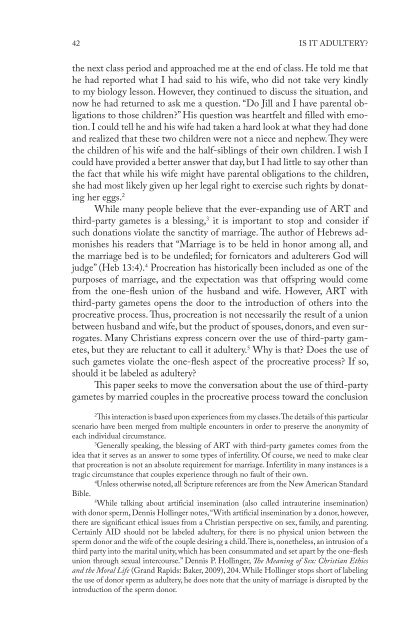experienced praying donating
SWJT%2059.1_Lenow
SWJT%2059.1_Lenow
You also want an ePaper? Increase the reach of your titles
YUMPU automatically turns print PDFs into web optimized ePapers that Google loves.
42 IS IT ADULTERY?<br />
the next class period and approached me at the end of class. He told me that<br />
he had reported what I had said to his wife, who did not take very kindly<br />
to my biology lesson. However, they continued to discuss the situation, and<br />
now he had returned to ask me a question. “Do Jill and I have parental obligations<br />
to those children?” His question was heartfelt and filled with emotion.<br />
I could tell he and his wife had taken a hard look at what they had done<br />
and realized that these two children were not a niece and nephew. They were<br />
the children of his wife and the half-siblings of their own children. I wish I<br />
could have provided a better answer that day, but I had little to say other than<br />
the fact that while his wife might have parental obligations to the children,<br />
she had most likely given up her legal right to exercise such rights by <strong>donating</strong><br />
her eggs. 2<br />
While many people believe that the ever-expanding use of ART and<br />
third-party gametes is a blessing, 3 it is important to stop and consider if<br />
such donations violate the sanctity of marriage. The author of Hebrews admonishes<br />
his readers that “Marriage is to be held in honor among all, and<br />
the marriage bed is to be undefiled; for fornicators and adulterers God will<br />
judge” (Heb 13:4). 4 Procreation has historically been included as one of the<br />
purposes of marriage, and the expectation was that offspring would come<br />
from the one-flesh union of the husband and wife. However, ART with<br />
third-party gametes opens the door to the introduction of others into the<br />
procreative process. Thus, procreation is not necessarily the result of a union<br />
between husband and wife, but the product of spouses, donors, and even surrogates.<br />
Many Christians express concern over the use of third-party gametes,<br />
but they are reluctant to call it adultery. 5 Why is that? Does the use of<br />
such gametes violate the one-flesh aspect of the procreative process? If so,<br />
should it be labeled as adultery?<br />
This paper seeks to move the conversation about the use of third-party<br />
gametes by married couples in the procreative process toward the conclusion<br />
2<br />
This interaction is based upon experiences from my classes. The details of this particular<br />
scenario have been merged from multiple encounters in order to preserve the anonymity of<br />
each individual circumstance.<br />
3<br />
Generally speaking, the blessing of ART with third-party gametes comes from the<br />
idea that it serves as an answer to some types of infertility. Of course, we need to make clear<br />
that procreation is not an absolute requirement for marriage. Infertility in many instances is a<br />
tragic circumstance that couples experience through no fault of their own.<br />
4<br />
Unless otherwise noted, all Scripture references are from the New American Standard<br />
Bible.<br />
5<br />
While talking about artificial insemination (also called intrauterine insemination)<br />
with donor sperm, Dennis Hollinger notes, “With artificial insemination by a donor, however,<br />
there are significant ethical issues from a Christian perspective on sex, family, and parenting.<br />
Certainly AID should not be labeled adultery, for there is no physical union between the<br />
sperm donor and the wife of the couple desiring a child. There is, nonetheless, an intrusion of a<br />
third party into the marital unity, which has been consummated and set apart by the one-flesh<br />
union through sexual intercourse.” Dennis P. Hollinger, The Meaning of Sex: Christian Ethics<br />
and the Moral Life (Grand Rapids: Baker, 2009), 204. While Hollinger stops short of labeling<br />
the use of donor sperm as adultery, he does note that the unity of marriage is disrupted by the<br />
introduction of the sperm donor.


